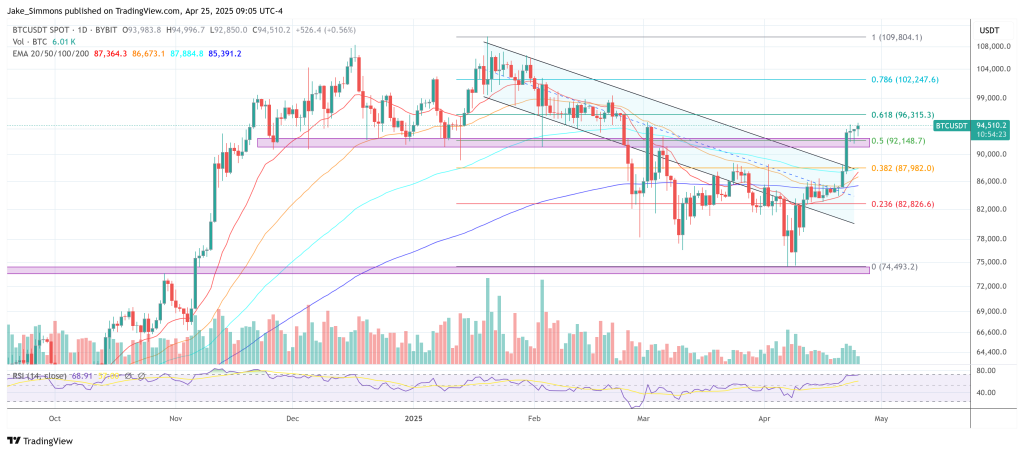Bitcoin should be valued as “an uncorrelated asset that benefits when the world gets messier,” BlackRock’s US Head of Equity ETFs Jay Jacobs told CNBC in an interview on Thursday.
“Crypto over the long run is decoupled from US tech stocks,” Jacobs , stressing that short-term market stress can mask the difference but that “the long-term correlation between US stocks and Bitcoin is more like two or three percent.” He argued that what pushes equities higher—“higher growth, higher certainty, lower geopolitical risk”—is the mirror image of the forces that move Bitcoin. “Bitcoin thrives when you have more uncertainty and are looking for something that’s going to behave differently, so fundamentally they should behave like an uncorrelated asset.”
BTC was changing hands just under $94,000 during Jacobs’ appearance, extending a rally that has added roughly 150% since spot-ETF approvals early last year.
Jacobs tied price behaviour directly to flows. “We would think over the long term, if this trajectory of greater uncertainty around the world continues, things like gold and Bitcoin should continue to go up.” He noted that investors are repositioning accordingly: “We’ve seen significant inflows into gold ETFs; we’ve seen significant inflows into Bitcoin, and this is all because people are looking for those assets that will behave differently.”
The biggest beneficiary has been BlackRock’s own iShares Bitcoin Trust (IBIT), which on 23 April absorbed $643 million of net creations—its largest one-day haul since January—lifting to roughly $54 billion.
Jacobs framed the rush into hard assets as part of a longer geopolitical realignment. “If you look at central banks around the world, a continued movement towards diversification beyond just holding dollars is something that’s been happening for decades… the switch from just holding dollars to holding gold to looking at other types of assets like Bitcoin is a trend that’s been years in the making.”
Central-bank illustrate the shift: net buying topped 1,044 tonnes in 2024, the third consecutive year above the thousand-tonne mark, double the average of the previous decade.
He linked those reserve moves to BlackRock’s 2023 “mega-forces” framework, which identified geopolitical fragmentation as a secular driver of returns. “That mega force is materialising in policies like reshoring in the United States and, I think, directly related to that fragmentation has been the rise of things like Bitcoin, as people see more destabilisation in geopolitics resulting in the need for more alternative assets.”
BlackRock’s influence is difficult to overstate: the firm ended the first quarter with a record $11.6 trillion under management.
By pairing that scale with a public thesis that Bitcoin’s fair price rises as uncertainty deepens, the asset-manager is effectively codifying a in which scarcity and sanction-resistance—not discounted cash flows—set the marginal price.
As Jacobs put it, the market is “looking for alternatives—parts of the portfolio that are going to behave separately from stocks and bonds.” With IBIT now swallowing more BTC each day than miners can produce post-halving, his remarks may offer the clearest blueprint yet for how the world’s largest asset manager thinks about pricing the world’s largest cryptocurrency.
At press time, BTC traded at $94,510.
